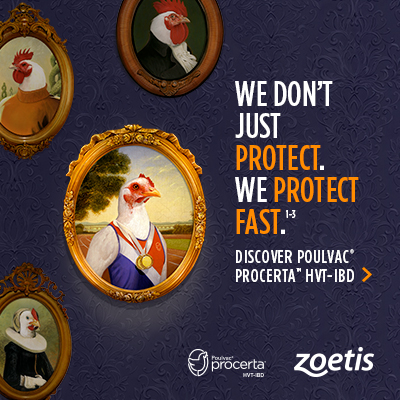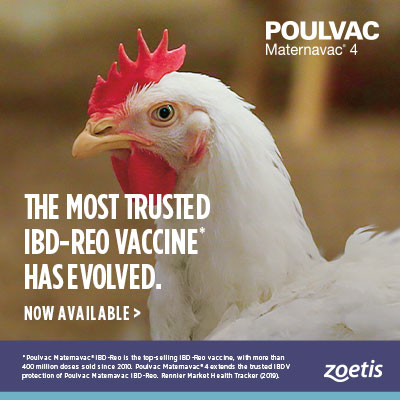Latest breeder, broiler vaccines provide consistent IBDV immunity
An interview with Kalen Cookson, DVM, MAM, Director of Clinical Research, Zoetis
Q: Zoetis introduced two new vaccines for managing infectious bursal disease virus (IBDV) during a 15-month period — Poulvac Maternavac® 4 and Poulvac® Procerta™ HVT-IBD. Why the focus on IBDV?
KC: IBDV remains a major threat to commercial flocks worldwide.1 Most US broilers are at risk because they are raised on built-up litter. IBDV destroys the antibody-producing bursa of Fabricius, which can lead to severe immunosuppression,2 especially in broilers under 3 weeks of age. That’s a big concern now that more than 60% of broilers are raised without antibiotics.
In addition, the predominant IBDV variants circulating have changed a lot over the years. The original Delaware E variant viruses, for instance, have been largely displaced by the AL2 variant family, which is now predominant.3 We recognized the need for vaccines that provide better protection against the IBDV challenges of today.
Q: Do Poulvac Maternavac 4 and Poulvac Procerta HVT-IBD protect against the newer IBDV variants?
KC: Yes. Both Poulvac Maternavac 4 and Poulvac Procerta HVT-IBD protect against the prevalent AL2 variant, for example.4-6
Q: Why have two vaccines if they both provide the same types of protection?
KC: Because they work in fundamentally different but critically important ways. Poulvac Maternavac 4, which we introduced in 2019, is an injectable, inactivated, four-way vaccine for breeders. Inactivated IBDV vaccines work by hyperimmunizing broiler breeders so they pass on high maternal antibodies to broiler offspring. Passive immunity is the single, most efficient way to prevent IBDV infections at a young age when birds are most vulnerable.
Poulvac Procerta HVT-IBD, which we more recently introduced, is a recombinant vector vaccine that is given to broilers for active immunity, usually by in ovo administration, although it is also given by subcutaneous injection to egg layers.
Q: Do Poulvac Maternavac 4 and Poulvac Procerta HVT-IBD compete with or complement each other?
KC: They actually complement each other because one picks up where the other leaves off. Maternal antibodies that broilers receive from vaccinated breeders start to wear off at around 2 weeks of age. That’s about the same time immunity from Poulvac Procerta HVT-IBD kicks in.7-10 The sooner a recombinant vaccine initiates immunity, the less potential there is for a gap in protection and, thus, less risk of profound immunosuppression.
Q: If both vaccines are used, does that eliminate the need to vaccinate broilers with a live IBD vaccine either in the hatchery or in the field?
KC:Probably so, unless there are unusual circumstances. Broilers confronted with a very strong IBDV field challenge and/or having poor maternal immunity, for example, might also need vaccination with a live IBDV vaccine.
Q: Is it true that HVT-IBD recombinant vaccines shouldn’t be used for more than 1 to 2 years and, if so, why?
KC: IBDV has a built-in ability to adjust to various conditions. It’s also an RNA virus, so it makes mistakes when it replicates. Replication is fuel for change and the emergence of different IBDVs. It stands to reason that rotating vaccines might help keep IBDVs “on their toes,” so to speak, and deter them from adjusting.
Q: How will veterinarians and producers know when it’s time to bring in a different IBDV vaccine?
KC: I recommend routinely conducting bursal surveys every 1 to 2 years to keep tabs on the IBDV field challenge. Bursa samples need to be submitted to a lab for polymerase chain reaction +/- histological analysis. The surveys will help determine the field infection window as well as the types of IBDV circulating, which may indicate a need to change the IBDV-control plan. Zoetis can help with this. We like to get results from several flocks at around 18 to 30 days of age.
Q: So, if you’re using a recombinant HVT-IBD vaccine and want to rotate to another vaccine, what type would you use?
KC: You could rotate to a live vaccine or an immune-complexed vaccine. Bursaplex® would be one example. It’s a live, immune-complexed vaccine that can be given subcutaneously or in ovo. It’s been shown to be as effective as a herpesvirus of turkey recombinant vector vaccine and can even limit field-challenge replication.11
Q: Do you have a take-home message for producers who need to improve IBDV control in their flocks?
KC: Between Poulvac Maternavac 4 and Poulvac Procerta HVT-IBD, producers now have two dependable, complementary tools to help them protect broilers against today’s IBDV challenges.
1 Infectious bursal disease in poultry. Merck Manual. https://www.merckvetmanual.com/ poultry/infectious-bursal-disease/infectiousbursal-disease-in-poultry
2 Michel L, Jackwood D. Classification of infectious bursal disease virus into genogroups. Archives Virol. 2017;162:3661-3670.
3 Cookson K, et al. A survey of wild type IBDV isolated from broiler flocks in the United States since 2014. 2020 International Poultry Scientific Forum, Atlanta, GA.
4 Data on file. Study Report No. 040322-KC70AQO-KC-6121. Zoetis LLC.
5 Cookson K, et al. A survey of wild type IBDV isolated from broiler flocks in the United States since 2014.
6 Data on file. Study Report No. B815R-US-19- B80. Zoetis LLC.
7 Ibid.
8 Data on file. Study Report No. B815W-US-19- A92. Zoetis LLC.
9 Data on file. Study Report No. B815R-US-19- B22. Zoetis LLC.
10 Gelb J, et al. Efficacy of Recombinant HVT-IBD Vaccines Administered to Broiler Chicks from a Single Breeder Flock at 30 and 60 Weeks of Age. Avian Dis. 2016 Sep;60(3):603-12. 11 Data on file. Study Report No. 014-14-70AQO. Zoetis LLC.
All trademarks are the property of Zoetis Services LLC or a related company or a licensor unless otherwise noted.
TOOLBOX, Issue 23
Toolbox is a series of interviews with veterinarians and other technical specialists about their experiences managing antimicrobials, vaccines and other tools for poultry health. It is produced by the editors of Poultry Health Today on behalf of the US Poultry Business of Zoetis.
BIO-00296
February 2021
Posted on February 9, 2021














